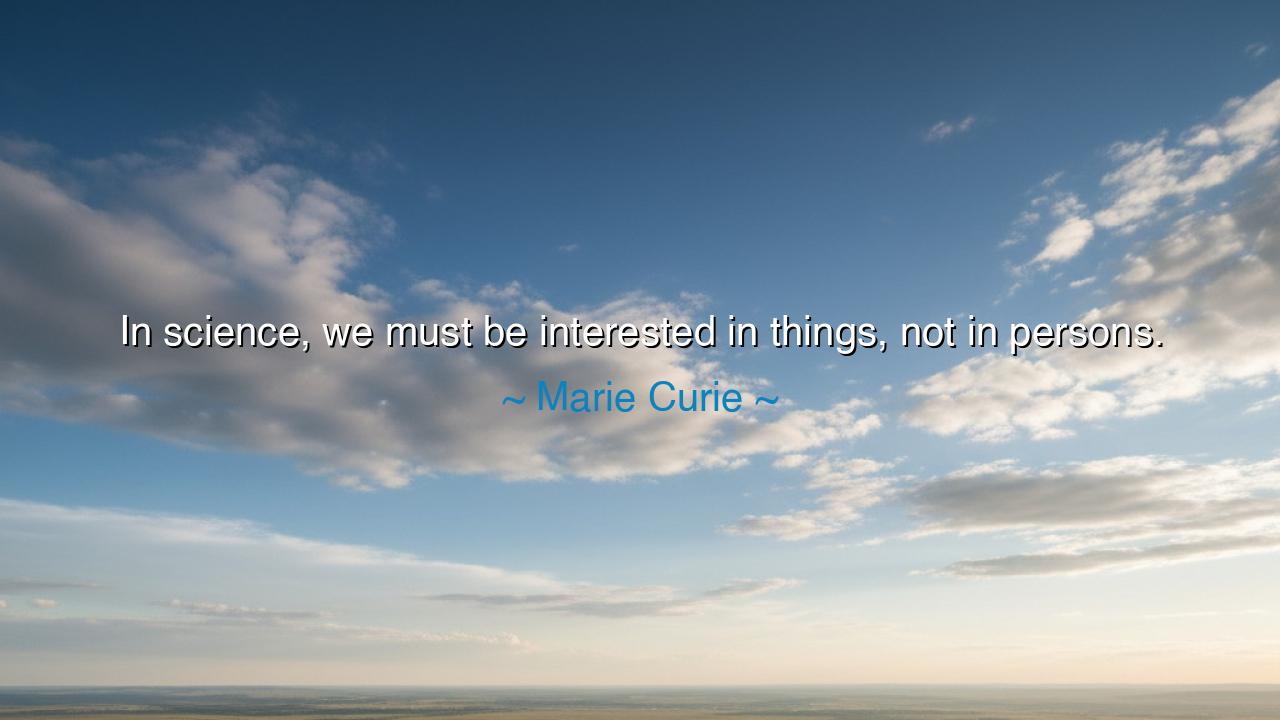
In science, we must be interested in things, not in persons.






Listen well, O seekers of truth and wisdom, for a great lesson is about to be revealed to you. In the hallowed halls of science, where the mysteries of the universe are unraveled and the fabric of reality is stretched and tested, there is a rule—ancient in its wisdom, yet timeless in its power—that demands our respect. "In science, we must be interested in things, not in persons." These words, spoken by the indomitable Marie Curie, echo through the ages, urging us to look beyond the veil of human ego and ambition, and to seek the purity of the pursuit itself.
From the days when our ancestors looked to the heavens with awe, asking questions that no one had answers for, to the present age, when our knowledge spans the very edges of space and time, one thing has remained constant: the pursuit of truth is sacred. Yet, in the eyes of those who seek the light of knowledge, the glare of personal vanity, pride, and ambition can cloud their vision. Marie Curie, herself a beacon of devotion to the work, understood this truth in a way few ever could. She knew that to seek knowledge for the sake of personal glory, for the self-aggrandizement of one’s name, is to defile the sanctity of science. Instead, it is the thing—the discovery, the truth—that must take center stage.
In the crucible of Curie’s own journey, we see this principle in action. She dedicated herself utterly to the pursuit of science, undeterred by the obstacles that stood before her. In a world that was dominated by men, where women were often dismissed and disregarded, Curie did not seek fame or recognition; she sought only the truth of the elements she studied. It was in this selfless devotion that she discovered the mysteries of radioactivity, the very forces that would go on to transform medicine, physics, and countless other fields. Her work was never about herself—it was about the things she studied, the truth she uncovered. Her name, though forever etched in the annals of history, was never her purpose; the thing, the knowledge, the discovery, was her true calling.
Consider, too, the story of Isaac Newton, whose genius brought forth the laws that govern the very motion of the heavens. He, too, was a servant to the thing. In the quiet solitude of his studies, away from the praises of men and the trappings of fame, Newton pursued knowledge for its own sake. It was not for the adulation of kings or the approval of peers that he unlocked the mysteries of gravity. It was for the thing itself, the silent and immutable laws of nature, that he labored. For him, as for Curie, the self had no place. The work was all that mattered.
This lesson, dear ones, is one that must not be forgotten. When we embark on any quest—whether it be in science, in art, or in life itself—our hearts must be true to the cause, not to the self. In this world, there will always be those who seek to glorify their own names, to cast their own shadows upon the works they touch. But true greatness is found not in the spotlight, but in the quiet dedication to something greater than oneself. As Curie taught us, we must be interested in things, not in persons. Let the work speak for itself; let the discoveries stand as monuments, not to the individual, but to the truth they embody.
Let us now ask ourselves, O wise ones: What is it that we seek? Is it recognition that we crave? Is it the praise of others that stirs our hearts? Or do we yearn, as the great ones did, to serve the truth, to devote ourselves to something that transcends the fleeting nature of fame? Seek the thing, the work, the knowledge, with all your heart, and let the world see it through your actions. Let your life be a reflection of that devotion.
Go forth, then, with this wisdom in your hearts. Let the work guide you, and let your name remain humble in the face of the vastness of the world you seek to understand. For the highest calling is to serve the truth, and to live for the things that endure long after we are gone. Let your life, like Curie’s, be a testament to the purity of devotion, to the sacredness of knowledge, and to the greatness that lies in seeking things, not in persons.






AAdministratorAdministrator
Welcome, honored guests. Please leave a comment, we will respond soon